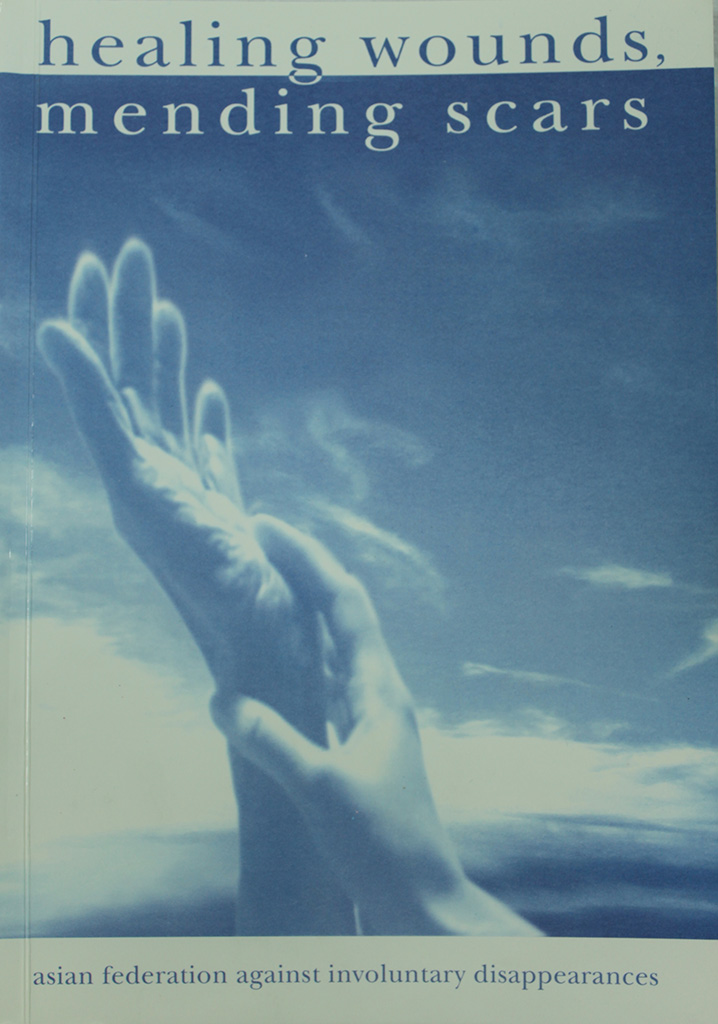“Healing Wounds, Mending Scars”, is a response to the challenge of disclosing the phenomenon of enforced or involuntary disappearances in a significant number of countries in the Asian continent, which, as per report of the United Nations Working Group of Enforced or Involuntary Disappearances (UNWGEID), has the highest number of cases reported during the last two of years.
Enforced or involuntary disappearance is the cruelest form of human rights violation. Its concrete manifestations on the families of the victims could be gleaned from the vivid true-to-life stories of pain, anguish, and continuing torture suffered by the survivors – fathers, mothers, brothers, sisters, sons and daughters of the disappeared, many of whom remain unhealed due to the loss of their loved ones.
During this period when the member-states of the United Nations Commission on Human Rights are seriously drafting, in a manner so legalistic, a legally-binding normative instrument for the protection of all persons from enforced or involuntary disappearances, the publication of this book is timely.
The book speaks of real stories told personally by the families of the victims, most of whom participated in the First Sharing of Experiences of Asian Families of the Disappeared held in Jakarta, Indonesia on December 2-10, 2004. The stories vividly reflect the lives of the families of the disappeared that remain broken and their hearts that continue to bleed because of the involuntary disappearance of their loved ones. The stories give a human face to the seemingly legal issue of enforced or involuntary disappearances.
Amidst the darkness brought about by this social malady is a ray of hope amidst despair. The stories tell of healing of wounds and mending of scars – a very poignant process, which is difficult and almost impossible to achieve in a context where cases remain unresolved and in fact, continue to happen in a number of countries.
As can be gleaned from the country situations focusing on enforced or involuntary disappearances, the stories are not isolated cases but are a microcosm of systematic violations of human rights perpetrated in the name of national security. They happened in various contexts generally characterized by poverty and social injustice and aggravated by dictatorships, internal conflicts and the likes. The figures mentioned are not mere cold statistics - they mirror the magnitude of suffering of the victims.
The book, however, has its limitations, since the disappeared, being physically absent, are not anymore with us to tell their stories. We only have the benefit of listening to a few stories from survivors who themselves experienced the horror of disappearance in their lifetime. Their stories give us a glimmer of light as we walk through this dark night of the disappeared.
The stories coming from Latin America and Africa speak of one universal language of pain, hope, struggle for the much-cherished dream for the revelation of the truth, the attainment of justice and redress and the reconstruction of the historical memory of those who made the supreme sacrifice of their lives so that we may savor the fruit of justice, peace, freedom. They also speak of the imperative to forge and fortify our solidarity in the face of the formidable enemies – the perpetrators and their powerful masters.
The process of healing wounds and mending scars is organizationally manifested in the birth, infancy and eventual growth and maturity of the Asian Federation Against Involuntary Disappearances (AFAD) – an organizational response to this regional phenomenon that continues to haunt the victims and the greater society each passing day.
Linking arms with the Latin American Federation of Associations of Relatives of Disappeared-Detainees (FEDEFAM) and the African Network Against Involuntary Disappearances (RADIF) and other similar formations in other continents, AFAD tirelessly struggles to foster international solidarity and advocacy to combat impunity so that never more shall this malady occur in the face of the earth.
Told by the families of the disappeared, survivors and human rights defenders, the book speaks of life and love amidst inhumanity and cruelty; of pain turned into courage; of hope against despair, of struggle in the face of intensifying repression; of empowerment and solidarity that transcend diversity in many respects and of healing wounds and mending scars both in their personal and societal sense.
We can only hope that through this humble compendium of lingering recollections and ardent thought-pieces, we are able to reinvigorate the youthful memories of the old and kindle the unequivocal commitment of the young.

